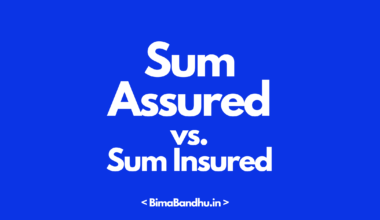Wondering how life insurance is different from whole life insurance?
With life insurance becoming a necessity these days for almost everyone, many people think more about selecting the right tenure for a term insurance plan. Since death is an inevitable eventuality in everyone’s life, people want to get the assured benefits of a term plan by choosing a longer policy period. No matter how long this period is, it is still limited under term insurance. It is where whole life insurance takes the center stage – to provide life insurance coverage for the entire life.
Let’s cover the concept of whole life insurance in this complete guide.
What is Whole Life Insurance?
A whole life insurance policy is a type of life insurance under which you can get insurance coverage for the whole life, i.e., till the time you reach the age of 100. Like every other life insurance policy, the continuity of coverage depends on paying the premiums regularly.
Also known as permanent life insurance, whole life insurance offers guaranteed death benefit of the policy nominee in case of the untimely demise of the insured individual during the policy period. As the policyholder, you can decide how much sum assured you would like to choose as the death benefit.
Under the whole life insurance policy clauses in India, you will also receive matured endowment coverage as a maturity benefit provided you survive up to 100 years of age. In most cases, whole life insurance comes with the dual advantages of bonus and life cover. You will pay the premium for the first 10-15 years (limited premium payment period) and get insurance coverage for your entire life. Since the total premium is payable in a limited period, it is higher than spreading the amount over a longer term in a term plan.
How Does Whole Life Insurance Work?
A whole life insurance plan is designed with the aim to provide life cover to the insured individual for his entire life, thus making him live a financially secure life. It tends to create a financial cushion for the family members in case of his/her accidental death.
A typical whole life insurance policy works as follows –
As the policyholder, you pay a certain premium as per the preferred payment mode – monthly, quarterly, or annually. In return, the insurance company provides life insurance coverage along with bonuses on survival till the plan matures.
The selection of a suitable whole life plan is in your hands. You can pick the one that best fulfils your needs. Because of the long-term benefits it offers, you can plan to cover your life under this type of life insurance policy.
What are the Features of a Whole Life Insurance Policy?
| Features | Explanation |
| Death benefit | Sum assured is payable to the policy nominee in the event of the unfortunate demise of the insured. |
| Fixed premium for life | The whole life insurance premium does not increase or decrease during the plan tenure. |
| Financial protection for family | The family of the deceased receives the insurance benefits to maintain their lifestyle. |
| Tax savings | The premium paid and the maturity benefits are not taxable. |
| Loan facility | The insured can borrow a loan against the policy after completing three years of buying it. |
What are the Benefits of Buying Whole Life Insurance?
The primary benefits of buying a whole life insurance plan are as follows:
- Life insurance coverage until 100 years of age
- Assured financial benefits for the insured’s family
- Maturity benefits as a lumpsum amount or monthly income depending on the policy terms
- Tax benefits under Section 80C and Section 10(10D)
- Financial support for long-term economic goals
- Loan facility to meet various needs in life
You May Also Like to Read: Why Buy Life Insurance?
What are the Types of Whole Life Insurance?
Whole life insurance does not have any fixed term associated with it. However, this form of life insurance is classified into the following types:
| Type | Definition |
| Non-participating whole life insurance | Low-cost life insurance plan that does not pay any dividend or bonus facility |
| Participating whole life insurance | Plan that offers benefits and bonus (returns) because of investments made using the premium paid by the insured |
| Pure whole life insurance | Policy for which the premiums are paid continuously throughout life until death and risk benefit is for the entire life duration |
| Single premium whole life insurance | Policy type for which the entire premium is paid with a single payment, guaranteeing a specific sum assured to the beneficiary |
| Limited payment whole life insurance | Plan for which the insured needs to pay the premium for a limited number of year or till a certain age while the risk cover continues |
What is the Difference Between Whole Life Insurance and Term Insurance?
Many of us feel confused about selecting between a term plan or whole life insurance. Since the final decision must be based on your financial objectives and needs, you must understand the difference between term insurance and a whole life cover plan.
Let us dig deeper into the key differences between whole life cover and term insurance.
| Whole Life Insurance | Term Insurance |
| It offers the benefits of life cover and savings. | It is meant for life protection and offers no other benefit apart from the death benefit (pure term plan). |
| A part of the premium is investment in different instruments, while helps in getting returns in the form of bonuses. | A term plan has no investment feature. |
| The policy period is flexible and covers the insured till the age of 100. | A fixed policy period is to be chosen by the insured at the time of buying the policy. |
| It can be used to get loan facilities at low interest rates. | A term plan does not offer any loan facility. |
| The premium is higher. | The premium is comparatively lower. |
| It offers survival benefits. | It only offers death benefits (the rest depends on the type of term insurance chosen) |
What are Whole Life Insurance Riders?
Most of the life insurance companies in India offer optional riders that you can add to your whole life insurance policy for additional benefits. Some of the most common whole life insurance riders are:
| Rider | Definition |
| Premium Waiver | Offers the benefit of waived-off future premiums in case the insured passes away or suffers from a disability; the policy still remains active. |
| Partial/Permanent Disability | Provides income for a certain period if the insured individual suffers from partial or permanent disability |
| Accidental Death Benefit | Offers additional financial benefits to the policy nominee in case the policyholder dies untimely |
| Critical Illness | Takes care of the medical expenses incurred due to a critical illness which could lead to loss of regular income |
| Income Benefit | Offers one-time lumpsum amount to the nominee to manage regular expenses |
** The terms/conditions and benefits of whole life insurance riders may vary from one policy to the other. In case you seek more information, please ask the chosen insurance company.
Who Should Buy Whole Life Insurance?
Ideally, whole life insurance is good for all types of individuals who want to provide financial security to their loved ones. In general, people falling into the following categories should buy it at the right age:
- Those who want to build a financial cushion for the family’s future
- Those who seek good returns for their investment along with lifetime insurance coverage
- Those who wish to build a significant corpus for retirement
- Those who want to maximise tax-savings
List of Various Whole Life Insurance Plans in India
Given below is the list of some of the most popular whole life insurance policies available in India:
- HDFC Life Sampoorn Samridhi Plus
- Aegon Life Guaranteed Income Advantage Insurance Plan
- IndiaFirst CSC SubhLabh Plan
- IDBI Federal Whole Life Insurance
- Max Life Whole Life Super
- Kotak Premier Life Plan
- Pramerica Sahaj Suraksha
- PNB MetLife Whole Life Wealth Plan
- SBI Life Subh Nivesh
- Reliance Life Long Savings
Disclaimer: “BimaBandhu does not endorse or recommend any particular insurance product or insurance company. Please read the policy benefits carefully before investing.”
Whole Life Insurance FAQs
-
Is buying whole life insurance a good investment decision in life?
A whole life insurance plan is a good choice for individuals who wants to leave a corpus for their loved ones after he is not around. As a policy buyer, you can get life insurance coverage up to the age of 100 years.
-
Are whole life insurance policies quite expensive?
The cost comparison of different whole life insurance plan must be done based on the benefits they offer. If you feel the premium of such a plan is good with respect to the premium, you can choose to buy it.
-
What is the right age to buy whole life insurance?
In general, you are eligible to buy this type of life insurance policy if your age lies between 18-65 years. The earlier you buy it, the lower will be the premium payable.
-
Which is better – whole life insurance or term insurance?
Both these types of life insurance have their unique advantages. Before you choose between the two, you must assess the requirements and understand the policy benefits carefully.
-
When does a whole life insurance policy build cash value?
Your life insurance provider can tell you more about the exact time-frame your plan will take to build cash value.
-
Can I withdraw a specific amount from my whole life insurance plan?
This facility depends on the type of plan you buy and the related terms and conditions.
-
What will happen if I survive post the age of 100 years.
Whole life insurance matures at the insured’s demise or when it reaches the maturity age. In case you survive the policy period, you will get the benefits as defined in your policy terms.
-
Is it possible to convert a term plan into a whole life insurance plan?
In most cases, this conversion is possible. However, you should know that the whole life insurance premium is higher than that of a term plan.
-
Is whole life insurance a good choice for retirement planning?
Yes. Since it allows partial withdrawal of money after the premium payment tenure and offers bonuses, you can plan your retirement by starting to invest in a suitable plan.
-
Can senior citizens buy whole life insurance?
It depends on the entry age. However, it is not of much help for any senior citizen in those later years of life.
-
What happens when a whole life insurance plan is canceled by the policyholder?
In such situations, he will receive the cash value of the plan as per its terms and conditions.
-
Does the whole life insurance premium change as I grow old?
It does not change but remains the same till your policy expires.
-
Is it possible to surrender a whole life insurance plan?
On surrendering a whole life insurance plan, you will receive the surrender value, which may differ from one insurance company to another.






